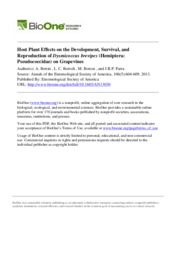Host plant effects on the development, survival, and reproduction of dysmicoccus brevipes (Hemiptera: Pseudococcidae) on grapevines.
Host plant effects on the development, survival, and reproduction of dysmicoccus brevipes (Hemiptera: Pseudococcidae) on grapevines.
Autoria: BERTIN, A.; BORTOLI, L. C.; BOTTON, M.; PARRA, J. R. P.
Resumo: Dysmicoccus brevipes (Cockerell, 1893) (Hemiptera: Pseudococcidae) is one of the most frequent and abundant mealybugs in Brazilian vineyards, where it causes direct and indirect damage to the vines. In this study, we investigated the effect of plant structures, cultivars, and vine rootstocks on the development, survival, and reproduction of D. brevipes under laboratory conditions. Leaves of the tablegrape cultivar ÔIta´liaÕ (Vitis vinifera) and ÔNia´gara RosadaÕ (Vitis labrusca) and the vine roots of the rootstocks Paulsen 1103 (Vitis berlandieriV. rupestris) and IAC 572 (Vitis caribaea101-14 Mgt) were used as host plants. D. brevipes developed on different vegetative structures, cultivars, and vine rootstocks. D. brevipes showed the shortest developmental period and highest survival and fecundity rates on leaves of cultivar Ita´lia. Survival on leaves was signiÞcantly higher than on roots. Roots of IAC 572 were unsuitable for D. brevipes development, resulting in nonreproductive females.ThemealybugsÕ longevityonleaves and vine roots was similar. Higher intrinsic and Þnite rates of increase and net reproductive rate were observed whenmealybugs developed on Ita´lia leaves.Weconcluded that the host plant affects the development and survival of D. brevipes and that the choice of the most appropriate cultivar or vine rootstock can help to reduce pest infestation, and is therefore an additional component to be included in the integrated pest management of grapes.
Ano de publicação: 2013
Tipo de publicação: Artigo de periódico
Unidade: Embrapa Uva e Vinho
Palavras-chave: Ciclo de Vida, Cochonilha, Dysmicoccus Brevipes, Porta-enxerto, Praga de planta, Uva, Viticultura
Observações
1 - Por padrão são exibidas publicações dos últimos 20 anos. Para encontrar publicações mais antigas, configure o filtro ano de publicação, colocando o ano a partir do qual você deseja encontrar publicações. O filtro está na coluna da esquerda na busca acima.
2 - Para ler algumas publicações da Embrapa (apenas as que estão em formato ePub), é necessário ter, no celular ou computador, um desses softwares gratuitos. Sistemas Android: Google Play Livros; IOS: iBooks; Windows e Linux: software Calibre.
Acesse outras publicações
Acesse a Base de Dados da Pesquisa Agropecuária (BDPA) para consultar o acervo completo das bibliotecas da Embrapa.

